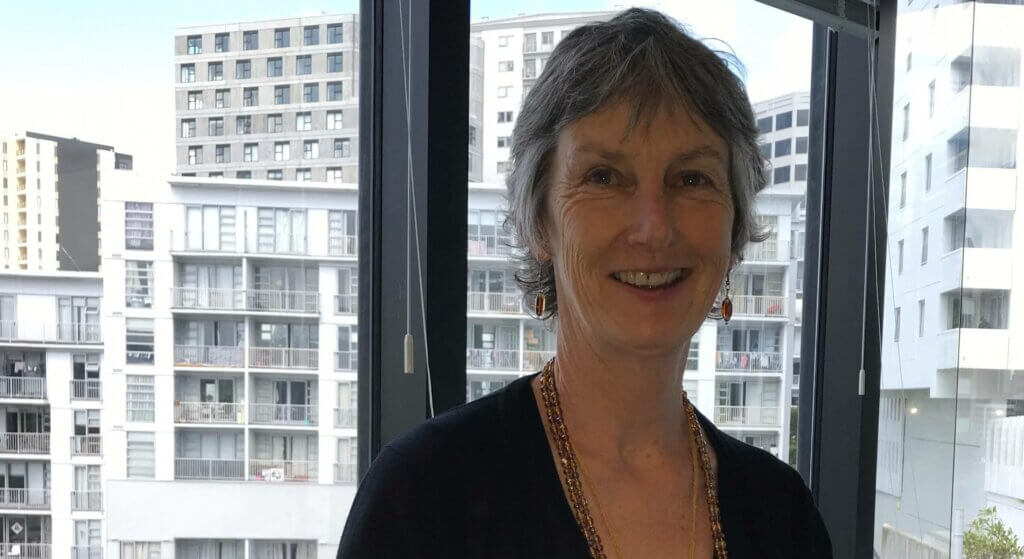Publish Date:
28 January 2020Keywords:
Lifewise outgoing chief executive Moira Lawler reflects on the last six years as a founding leader and champion for Housing First.

Every time we talk about chronic homelessness, people say what about families with children? When we talk about support in New Zealand, it’s really hard to move past that insanely competitive conversation about who deserves support the most. Everyone needs support. Why do we ration something that is internationally recognised as a basic human right? – Moira Lawler
Direct and unafraid to tackle uncomfortable conversations, Moira Lawler’s staunch advocacy for people experiencing chronic homelessness has played a critical role in growing public and cross-party support for Housing First.
Since day one at Lifewise, Moira was tasked with looking into ways to end homelessness. Under the previous chief executive, the Methodist Mission Northern had decided to move away from managing to ending homelessness – closing soup kitchens and night shelters in 2009.
During this time Lifewise supported ‘homelessness Czar’ Phillip Mangano to come over from the United States to speak to a conference in Christchurch on Homelessness: Prevention/Early Intervention – Whose Choice? A seminar that left a lasting impression on attendees working in the homelessness space.
“When I started, Lifewise had just secured a five-year funding partnership with Foundation North’s Catalysts for Change initiative to end street homelessness. So, as part of that we decided to use Housing First,” Moira said.
Moira’s leadership also saw Lifewise leverage their flagship fundraising event – the Lifewise Big Sleepout – to raise close to $300,000 to support their delivery of the programme and raise public awareness of Housing First as a proven, evidence-based approach to ending homelessness rather than managing it.
Human-centred design, cross-sector collaboration and collective impact became a major part of Moira’s journey in developing Housing First.
“I am enormously proud to have been part of getting a Housing First programme off the ground. Particularly one that is strongly steered by people with lived experience of homelessness,” Moira said.
“New Zealand is more advanced than other countries at incorporating the voices of people with lived experience. We lead the world in the mental health space. At Lifewise, we want people with lived experience in leadership, guiding our media, housing and workforce strategies. We want people with lived experience designing and running their own programmes.”
Moira believes that the co-design process with people who have lived experience has been critical to Housing First’s success. However, equally important, is the commitment to working within a kaupapa Māori framework.
“While not a kaupapa Māori programme, the makeup of the city centre is predominately Māori. This has ensured there is a tikanga overlay to the work we do. Yes, we have cultural and kaumatua support but we have also leant on the cultural wisdom, the mātauranga Māori held within the homeless community itself,” Moira said.
“You don’t have to be someone posh with a university degree from university to lead aspects of our work. It’s inspiring what people on the street know. There are so many fluent speakers of te reo and so many with so much to offer in terms of Māori world view.”
Integral to working within a kaupapa Māori framework is understanding that a person represents a wider family and need to be considered within a whānau context.
“When you house people, you get to meet the rest of their family. Most people experiencing chronic homelessness have siblings, often children and they generally have contact with family at least intermittently,” Moira said.
“But for whatever reason, they are the family member least able to cope with the circumstances of the entire family – generally abject poverty. There’s a perception [those experiencing chronic homelessness] are there because nobody loves them. That is not true. They are loved. They have just fallen through the gaps.”
The journey into starting Housing First has not only been one of collaboration with those who have lived experience of homelessness, alongside Tangata Whenua, it has also been one of inter-agency collaboration and collective impact. With many hailing it as one of the most successful examples of this to occur within Aotearoa.
“I am proud that we are by and large, with a few scrapes and bumps along the way, trying to implement Housing First in a really collegial way. We are trying to establish a real community of providers that support each other and share. That’s important because Housing First was designed for a particular [United States] cohort of people suffering chronic homelessness,” she said.
“We have to keep our conversations quite open, exploratory, and curious or we will just stick on one thing and try to fit it. I think that’s something that the government has been slow to understand. Yes, Housing First works for chronically homeless people working in the city centre, but it’s not going to fix all homelessness and that’s not what it claims to do.” We need to understand the whole system to make a sustainable difference over time.
ENDS